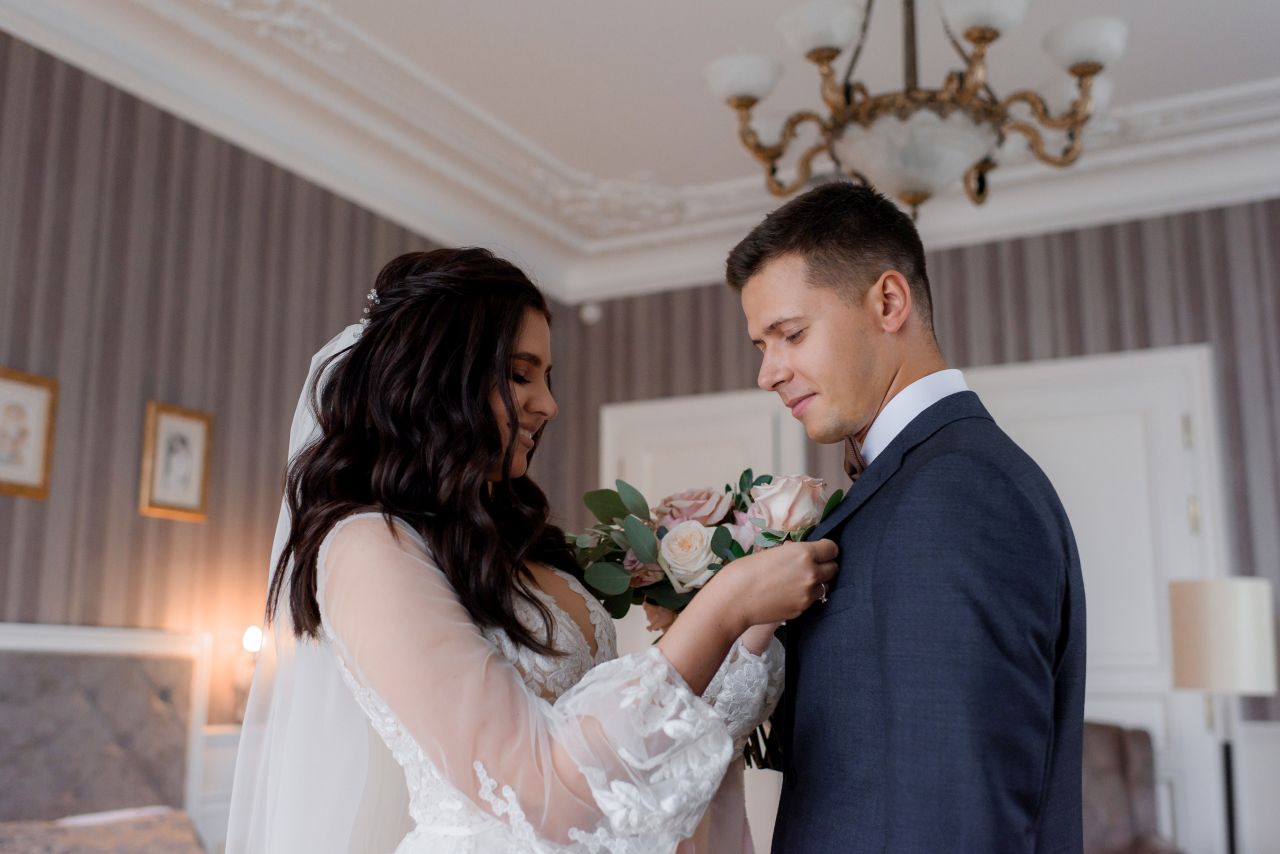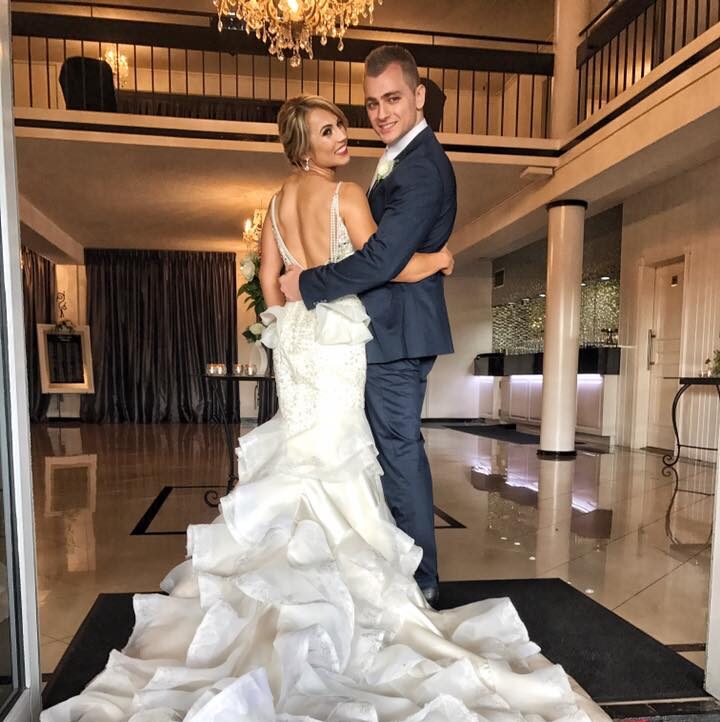Planning your wedding reception is all about creating moments that make your celebration unforgettable, and one of the best ways to do that is by filling your dance floor with energy and excitement. If you’re worried about getting everyone to dance, you’re not alone.
It’s a common concern, but with the right mix of music, atmosphere, and a little guest engagement, you can have your loved ones up and dancing all night. From hiring the perfect DJ to using creative dance floor tricks, here’s how you can turn your wedding reception into a true dance party that everyone will remember.
The Ideal Wedding Planning Timeline: When Should You Start?
Why Wedding Planning Should Start 12 to 18 Months Before the Big Day
When I got married at Vogue Ballroom in 2017, the first thing I learned was how quickly time flies in the lead-up to the big day. It seems like there’s always something that needs to be done. I tell every couple I work with: don’t underestimate how much goes into planning a wedding!
On average, couples should start planning their wedding 12 to 18 months ahead of time. This might sound like a lot, but trust me—it’s the sweet spot. Starting early allows you to secure your venue and preferred vendors, especially if you’re eyeing a popular time of year or a well-known photographer or florist.
For example, if you’re hoping to get married on a Saturday in Melbourne’s peak wedding season, say, in early December, venues and vendors can be booked out a year or more in advance. Starting 12 to 18 months ahead gives you the breathing room to avoid last-minute scrambles.
Now, let’s face it—life happens. Some couples may need to plan a wedding in 6 months or less. Is it doable? Absolutely, but it’ll require some flexibility. If you’ve already got your heart set on a particular venue, date, or vendor, things might get tricky. However, with the right mindset and organisation, you can pull it off.
Can You Plan a Wedding in 6 Months? Here’s How
In my experience, pulling off a wedding in less than a year is definitely a challenge, but it can be done. I worked with a couple from Melbourne who had a six-month engagement and, despite the tight timeline, they managed to create a wedding that was both beautiful and well-executed.
Here’s how they did it:
- Get Organised, Fast: The first step was booking the venue. This couple’s wedding was in the quieter winter months, so they didn’t face the same competition for Saturday dates. They secured their venue in just a week! Once the venue was booked, we moved on to securing vendors—photographers, florists, and entertainment—within the next month.
- Flexible with Choices: They weren’t picky about the exact shade of roses or having a specific colour palette. Instead, they chose more flexible options that still suited their vision. This flexibility helped them find a caterer, photographer, and DJ who were available on their date.
- Simplified Decisions: With a short timeline, they streamlined a lot of decisions. Instead of going with a lengthy tasting menu, they chose a set menu for guests. They also opted for a wedding dress that was available off-the-rack, rather than having a custom gown made.
So yes, while it’s definitely more stressful and limiting, planning a wedding in 6 months can be a reality if you’re adaptable and organised.
Initial Wedding Planning Steps: Setting the Foundation
Assessing Your Wedding Timeline and Budget
When I first started planning my wedding, I had to make a decision that impacted everything that followed: how much time and money can we realistically dedicate to this event? Setting a clear timeline and budget upfront is like laying down the foundation for your wedding house. It helps you determine what’s possible and avoid making rushed decisions that may lead to regrets down the track.
Start by deciding how long you want to plan your wedding. This step isn’t just about convenience—it helps dictate the pace of your decisions. For example, a wedding in 6 months requires quick, decisive action, while a wedding planned over 18 months gives you the luxury of time to make thoughtful choices. Your budget will have a significant impact on your timeline too.
If you’re working with a tighter budget, having more time can open up opportunities for discounts, off-season prices, or more negotiation flexibility with vendors.
Take the time to break down your wedding expenses early. From the venue to the catering and flowers, understanding where the bulk of your money will go is key to planning. I advise creating a simple spreadsheet or budget tracker to see how each category aligns with your overall budget.
This makes it easier to prioritise things like the venue, photographer, and catering, while understanding where you can trim costs if needed. Remember, it’s all about balancing your dream wedding with your financial reality!
Defining Your Wedding Vision and Priorities
Before you start chasing after florists, dress fittings, or wedding favours, it’s time to get clear on what you both want. I can’t stress this enough—your vision will shape every detail of your wedding. Think of it as the blueprint for your day.
My partner and I sat down early in our planning to discuss what mattered most. Were we focused on having an intimate, romantic celebration? Or did we want something grand and extravagant? This discussion helps with the bigger decisions, like choosing between a traditional venue or something more unique, like a vineyard or even a destination wedding.
Once you’ve outlined the overall vision, the next step is to define your wedding priorities. What’s the one thing you won’t compromise on? For me, it was the venue—having it at Vogue Ballroom meant a lot to us.
For another couple, it might be having a top-notch photographer or a live band. Whatever it is, knowing what’s non-negotiable will help keep you focused during moments of stress when decisions feel overwhelming.
I often remind couples to stay flexible in the early stages. Sometimes, we get so caught up in an idea that we forget other options might actually align better with our priorities. If your dream photographer is booked, don’t panic—there are plenty of talented professionals who may bring a fresh perspective to your day.
Choosing Your Wedding Party and Guests
As you start to define the big picture, one of the first practical steps is choosing your wedding party. I remember this stage being exciting but also a bit challenging. My partner and I both had a clear idea of who we wanted standing beside us.
However, when you’re close with so many people, there’s bound to be a bit of overlap and some tricky conversations about who to ask. Start early with this process, as people need time to clear their schedules and make travel arrangements if necessary.
Next up is your guest list. One of the first questions I ask couples is, “How many people are you planning to invite?” The size of your guest list will dictate much of the rest of your planning. When you’re starting the process, it’s essential to get a ballpark figure. Don’t worry if you have to tweak it later—that’s normal.
But having an estimate helps with venue selection and budgeting. You’ll be surprised how much you can’t move forward with without a clear headcount, especially when booking catering, seating arrangements, and even wedding favours.
Your guest list also plays into the type of venue you choose. If you’re dreaming of a grand ballroom reception, you’ll need a venue that can accommodate hundreds. On the other hand, if you’re thinking about an intimate wedding at a local vineyard, a small guest list will likely suit your vision better.
Securing Your Wedding Venue and Vendors: When to Act
How and When to Book Your Dream Wedding Venue
Booking your venue is one of the most important decisions in your wedding planning process. I recommend securing your venue 12 to 14 months in advance. Popular venues in Melbourne, especially during peak season, fill up quickly. For highly sought-after venues or dates (like a Saturday in December), try to book 18-24 months ahead to avoid disappointment.
Tip: When booking, it’s helpful to have flexible date options in case your first choice isn’t available. Being flexible with your date can increase your chances of securing the venue you love. If you need help organizing all these details, our wedding planning services can guide you through the process smoothly.
Vendor Timelines: The Key to a Stress-Free Wedding Day
Once the venue is locked in, it’s time to book your vendors. Your wedding planner (if you’re hiring one) should be one of the first bookings to make. A planner helps you stay on track and reduces stress. If you’re not using one, you’ll need to manage vendor timelines yourself, so stay organised.
Booking Wedding Vendors: What You Need to Know
- Photographers/Videographers: Book 12 months in advance. The best photographers get booked early, so don’t wait too long.
- Florists: Book 10-12 months ahead, especially if you have a specific florist in mind.
- Caterers: If your venue doesn’t cater, book 10-12 months in advance. Finalise the menu 8-9 months before.
- Entertainment (DJ/Band): Book your entertainment around 8-10 months ahead, as they can only take one wedding per day.
Secure your key vendors early, and confirm them well in advance to keep everything running smoothly.
Wedding Attire and Rings: Finding the Perfect Look
The Perfect Wedding Dress: When to Start Shopping
One of the most exciting parts of wedding planning is finding the perfect wedding dress, but don’t leave it until the last minute! From my own experience, I recommend starting the dress search at least 9-12 months before your big day. This allows enough time for fittings and alterations, especially if you’re ordering from a boutique or designer.
Wedding dresses typically take 5-6 months to make, and that’s before you consider alteration time. If you’re opting for a custom dress, you may need even more time. You don’t want to be in a rush to find the perfect gown, especially when it involves so much emotion and detail.
When choosing your bridal party’s attire, try to pick out bridesmaid dresses and groomsmen suits 6-8 months ahead. This gives your bridal party ample time to get fitted, and it avoids last-minute stress for everyone involved.
Wedding Rings: When to Start Shopping for the Perfect Pair
Wedding rings are another important item that requires planning ahead. I recommend starting your ring search 3-6 months before the wedding. It’s a good idea to visit a few jewellers and take your time to find the right style and fit. This is also a good time to consider engraving or customisation, as these can take extra time.
Ideally, you’ll have the rings purchased 3 months out and pick them up at least 1 month before the wedding. This ensures you have them in hand and ready for the big day.
Key Planning Tasks and Timelines: Everything Else You Need to Consider
Wedding Invitations and Save the Dates: Timing is Everything
While the venue and vendors are top priority, don’t forget about the wedding invitations and save the dates—these are crucial for setting the tone of your wedding and ensuring your guests have enough notice.
For destination weddings, you’ll want to send save the dates as early as 12 months in advance to give guests ample time to make travel arrangements. If it’s a local wedding, sending them out around 9-12 months before your wedding date is ideal.
As for the wedding invitations, aim to send them 6-8 weeks prior to the wedding. For a destination wedding or large-scale celebration, consider sending invitations 10-12 weeks prior, or even as far as one year before, so guests have enough time to RSVP and make travel plans.
Finalising the guest list and mailing the invitations at least 2 months before will give everyone enough time to respond.
Finalising Your Wedding Menu, Music, and Ceremony
The wedding menu is a big part of your reception, and booking your caterer early is key. Ideally, your caterer should be booked 10-12 months in advance, especially if your venue doesn’t include catering services. By 8-9 months before, you should have your menu locked down. This gives you plenty of time to schedule tastings, tweak the menu, and make sure everything is to your liking.
When it comes to wedding music, I recommend booking your DJ or band 8-10 months ahead to ensure you get the entertainment you want. You can begin choosing ceremony music and reception playlists around 8-9 months before.
Make sure to finalise your playlist 2 months before the wedding. This gives you ample time to plan the mood for each part of the event, whether it’s an intimate ceremony or a lively reception.
Lastly, the ceremony itself should be finalised with your officiant about 8-10 months before. This includes deciding on the order of service, vows, and any readings. If you’re writing your own vows, begin drafting them 1-2 months before. And always check in with your officiant around 2 weeks before the ceremony to ensure everything is set.
Destination Weddings: Extra Planning Time Required
Why Destination Weddings Need More Time
Destination weddings typically require 12 to 18 months of planning. The extra time helps with securing the venue, sorting out travel and accommodation, and giving guests enough notice to book flights. Unlike local weddings, destination weddings involve extra logistics, such as legal requirements for marriage, guest travel, and local vendors.
I’ve seen couples underestimate the time needed and end up scrambling. Booking early ensures you get your desired venue and vendors.
How to Manage Travel Arrangements and Save the Dates for a Destination Wedding
For a destination wedding, send save the dates 12 months in advance to allow guests time to arrange travel. A wedding website is a great tool to provide all the necessary details about travel, accommodation, and the schedule.
You can also reserve room blocks and arrange transportation, ensuring your guests have everything they need well in advance. Plan these details 8-9 months ahead to secure discounts and availability.
Factors That Can Impact Your Wedding Planning Timeline
Wedding Size and Complexity
The size and complexity of your wedding impact the timeline. A small, intimate wedding can be planned in less time, while a large wedding with many guests and vendors needs more time.
For a grand wedding in Melbourne, I recommend starting 18 months out to secure your venue, photographer, and caterer. If your wedding includes multiple events, start early to handle the logistics.
Popular Dates and Seasons
Peak wedding seasons like spring and summer in Melbourne require 12-18 months of planning, especially for popular Saturdays. If you’re flexible with your date, booking in the off-season (winter or weekdays) gives you more options and often better rates.
Guest Travel and Special Themes
For out-of-town guests or a destination wedding, send save the dates 12 months ahead to give them time to arrange travel. If your wedding has a special theme or unique decor, plan extra time to source everything you need.
Staying Organised and On Track with Your Wedding Planning
The Importance of Using Planning Tools to Stay on Track
Stay organised with checklists, spreadsheets, and wedding apps. These tools help you manage tasks, track your budget, and ensure deadlines are met. Apps like The Knot or WeddingWire are great for keeping everything in one place and reducing stress.
Delegate Tasks and Stay on Top of Deadlines
Don’t try to do it all yourself! Delegate tasks to your wedding party or trusted family and friends. Break down tasks into manageable steps to ensure everything gets done on time.
Top Tips for Wedding Day Success: Preparation is Key
Create a detailed wedding day timeline 1-2 months before your wedding and share it with your vendors and wedding party. Confirm everything 1-2 weeks prior and have an emergency kit with essentials like extra makeup and snacks to stay prepared for any surprises.
The key to a smooth wedding is starting early and staying organised. Whether you’re planning over 18 months or pulling together a quick wedding in 6 months, setting your timeline and priorities early helps ensure that no detail gets overlooked. Secure your venue and vendors early, stay flexible with decisions, and use planning tools to stay on track.




